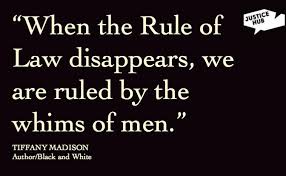 City Hall was abuzz on Tuesday as refinery advocates crammed council chambers to hear a proposed resolution on the use of hydrofluoric acid at the refinery. As critical as that issue is, perhaps the most buzzworthy item stemming from that meeting was the Council’s decision on a much more mundane matter involving bees and a dispute between neighbors.
City Hall was abuzz on Tuesday as refinery advocates crammed council chambers to hear a proposed resolution on the use of hydrofluoric acid at the refinery. As critical as that issue is, perhaps the most buzzworthy item stemming from that meeting was the Council’s decision on a much more mundane matter involving bees and a dispute between neighbors.
That decision was insightful as it is a reflection of the importance this Council puts on the rule of law. The rule of law is the legal principle that law should govern a nation, as opposed to being governed by arbitrary decisions of individual government officials.
According to Wikipedia, John Locke defined freedom under the rule of law as follows:
-
“Freedom of people under government is to be under no restraint apart from standing rules to live by that are common to everyone in the society and made by the lawmaking power established in it. Persons have a right or liberty to (1) follow their own will in all things that the law has not prohibited and (2) not be subject to the inconstant, uncertain, unknown, and arbitrary wills of others.”
The law in question on Tuesday was the Bee Ordinance. It was enacted by the Council in December 2015 after a lengthy nearly three-year process involving many community meetings and public hearings. The ordinance allows a citizen to keep bees on their residential property as long as they obtain a special permit.
In July of 2016 applicant, Mr. Voorhees, became the first person ever in the City of Torrance to file for a special permit to keep bees when he applied for two bee hives to be placed along his rear yard.
The adopted ordinance requires that upon receipt of an application that the Director of Community Development notify the residents living adjacent to the applicant. Those notified have ten (10) calendar days in which to protest the application in writing.
According to the ordinance, “A written objection in response to the notification … will automatically deny the special animal permit application.”
The law in this case is abundantly clear. It’s simple, straightforward, and unambiguous. The law provides that the neighbors of the applicant have a right to object and if one of them exercises that right, then the permit is automatically denied. The law does not require that a neighbor justify their objection. The objection itself is all that is required.
Pursuant to that language of the ordinance Ms. Russman, a neighbor of Mr. Voorhees who shares the back fence line where the bees were to be placed, dutifully submitted an objection writing that:
“I live next to the requestor. I reject the request strongly. I love my neighbors, but I have a problem with bees medically and mentally.”
Pursuant to Ms. Russman’s objection, the City denied the permit. That should have been it; case closed. But Mr. Voorhees, in his enthusiasm to pursue his bee keeping hobby, was not to be denied. He appealed the denial of his permit to the Environmental Quality and Energy Conservation Commission.
In preparation for the hearing, Ms. Russman presented documents explaining that she was attacked by a swarm of bees on two prior occasions. In each instance, she was stung in excess of 50 times and had to seek medical treatment. She suffered extreme emotional distress, physical pain, and swelling and as a result she continues to suffer emotional distress from the presence of bees.
In a letter Ms. Russman wrote that:
“Each time I see bees, I envision being attacked, I see bees coming at me. I start to fight. After the fighting I become immobilized in bed for days. I experience sleepless nights for a long period of time. The phobia is real … I love my home and enjoy Torrance. I don’t want to have to sell my home and move to another city for this reason.”
Ms. Russman also submitted a letter from a PhD in clinical psychology who affirmed her condition and wrote that, “Given the long history of this condition and the symptomology … it is apparent that beehives next door will greatly upset her emotional well-being, and quality of life.”
The Commission, Vice-Chaired by James Montgomery one of the leading proponents of the Bee Ordinance, heard the case in November 2016 and amazingly ruled against Ms. Russman.
To enforce her right guaranteed to her by law, Ms. Russman hired a lawyer and made an appeal before the City Council. On Tuesday, she received little sympathy. In ruling against her, Goodrich explained:
“To create an analogy here, I’ve never had a veteran that lives in the city that’s been diagnosed with PTSD come to the Council and ask us to stop the fireworks show because they don’t like the loud noises … Bees are unavoidable. I guess another analogy is are we going to deny a two story house that somebody applies for because their next door neighbor is afraid of heights. I’m just not willing to go there…”
No, no, no Goodrich. You are the only one making those ridiculous and completely unnecessary comparisons. It’s not about whether Ms. Russman’s fear is a valid reason to deny the permit. This case should have been decided purely as a matter of law. Was an objection made? Yes, it’s not disputed that there was. End of story. The permit should have been denied. The law demands it.
The Council not only made a decision in direct conflict with a law they created, but in so doing they also displayed stunning and remarkable inconsistency. How many times have we heard them say we need to defer to the experts. On the refinery safety issue alone it’s been a constant refrain. Yet, here in this case, they so willingly put themselves in the role of a medical expert despite the fact that not one of them has any professional medical training. Their ruling essentially invalidated the opinion of a PhD in psychology even though not one iota of evidence was presented to contradict that experts opinion.
If you believe this was an isolated circumstance, then you haven’t been paying attention. The only truly unique thing about this case is that the law the Council chose to ignore is one that they themselves enacted. It’s like somebody that tells you the rules of the game and then once play starts immediately violates those rules as soon as they are no longer to their benefit. Nobody likes to play games with people like that.
For those who think this matter is of no consequence I say beware. You may not object to your neighbor harboring bees, but perhaps on some other matter on another day it may be your rights that end up being subject to the inconstant, uncertain, unknown, and arbitrary whims of the Torrance City Council.
 At its most recent meeting, the School Board took the initial step to sell the Hamilton Center. The out of the ordinary nature of the proposal prompted Board Member Michael Wermers to comment that, “I’ve been up here for 8 years, we’ve never done anything close to this.” The Hamilton Center comprises of approximately 10.3 acres and is located at 2606 West 182nd Street.
At its most recent meeting, the School Board took the initial step to sell the Hamilton Center. The out of the ordinary nature of the proposal prompted Board Member Michael Wermers to comment that, “I’ve been up here for 8 years, we’ve never done anything close to this.” The Hamilton Center comprises of approximately 10.3 acres and is located at 2606 West 182nd Street.